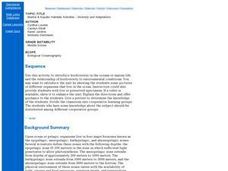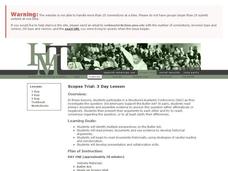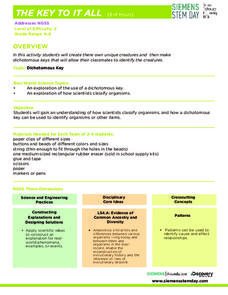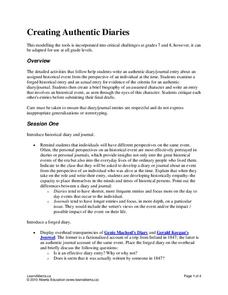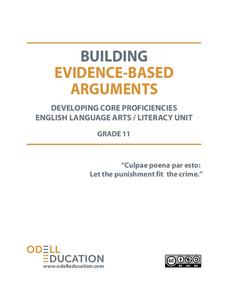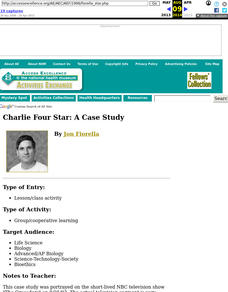Maryland Department of Education
The Concept of Diversity in World Literature Lesson 9: Debating Imperialism
To gain an understanding of Imperialism, class members read Rudyard Kipling's poem, "The White Man's Burden" and Mark Twain's essay, "To the Person Sitting in Darkness." Groups compare these perceptions of non-white cultures with the...
Curated OER
Marine & Aquatic Habitats Activities - Diversity and Adaptations
Students analyze biozones and how to identify and diagram them. They also research which organisms can adapt to different biozones.
LABScI
Taxonomy: Who is in My family?
Find similarities in seemingly unlike organisms. The second instructional activity in a series of 12 builds the concept of a taxonomy and explores the use of a dichotomous key. Learners begin in part one by attempting to group a set of...
Historical Thinking Matters
Scopes Trial: 3 Day Lesson
Was the Scopes trial more complicated than a simple debate between evolutionists and creationists? As part of a structured academic controversy (SAC) activity, pupils consider multiple perspectives of the Butler Act and engage in close...
Discovery Education
The Key to It All
Which characteristics make organisms unique? Dichotomous keys simplify the process of classifying organisms by focusing on these unique characteristics. Young scholars learn how to use the dichotomous key flow chart by creating their own...
Alberta Learning
Creating Authentic Diaries
Napoleon Bonaparte once said, "What is history but a fable agreed upon?" A series of lessons encourages learners to look beyond the basic fable agreed upon related to events in history and consider multiple accounts of the event. The...
Annenberg Foundation
Global America
It's not really a small world after all! The 21st lesson of a 22-part series on American history researches the impact of globalization on the United States. Using photographic and written references materials, as well as video sources,...
Curated OER
Diversity of Life
Young scholars study Arthropods and their characteristics. In this organisms lesson plan students explore the success of Arthropods and answer questions.
Curated OER
How Can Librarians Work To Eliminate Cultural Bias In The Organization Of Information?
Students explore the complexities of organizing information and to support librarians in developing strategies for reducing cultural bias. Students extend strategies to help raise solutions. Students list a variety of definitions on bias...
Curated OER
Diversity of Life: Pathogens
Pupils research bacteria and viruses that carry pathogens. In this diversity lesson, students examine how pathogens spread disease through bacteria and viruses. Pupils write a report on disease caused by bacteria or virus including the...
Curated OER
Diversity And Adaptations Of Organisms
Seventh graders investigate how organisms respond to environmental stimuli through their behavior. They observe how plants and animals respond to varying amounts of light, water and gravity.
Curated OER
Celebrating Diversity
Students celebrate diversity. In this cultural differences lesson, students use their research skills to create a Venn diagram that compares the beliefs and practices of 2 different cultures that they select.
Curated OER
Unity Versus Diversity
Students explore the 50 State Quarters program and how it represents diversity and unity of the United States. In pairs, they examine quarter designs to gain information about the culture of each state. Students create charts to...
Curated OER
Cultural Diversity
In this cultural diversity worksheet, young scholars respond to 7 short answer questions and answer 14 fill in the blank questions regarding the components of culture.
Curated OER
Real People, Real Farms: Case studies of organic agriculture
Eighth graders study examples of organic agriculture from around the country. In this sustainable agriculture lesson students apply what they learn to real life situations.
Curated OER
The International Monetary Fund, The World Bank, and the World Trade Organization: A Help or Hindrance to Developing Countries?
Eleventh graders study the International Monetary Fund, World Bank, and World Trade Organization. They collaborate in small groups to research and explore perspectives of each group, identify objectives of each group and key arguments...
Curated OER
Many Passages: The Voyage of the Slave Ship Brookes
Examine three perspectives of the slave trade - captain, sailor, and captive - through this collaborative analysis activity. Small groups study one perspective with a primary source to analyze. They discern what is a historical fact and...
Curated OER
What A Tangled Web We Weave
Learners of many ages discuss how all organisms rely on other organisms for their survival. They construct a food web and energy pyramids, and write an informative essay about the food web that they have designed.
Curated OER
Keys and Webs
Students explore and classify organisms found in a Rocky Mountain Ecosystem. Through discussions, students examine the effects upon an ecosystem if a component was removed or a new component was added. As a class, they survey reasons...
Odell Education
Building Evidence-Based Arguments: "Cuplae poena par esto: Let the punishment fit the crime."
Should a criminal's punishment match the crime? An argumentative writing plan explores this question as class members investigate a variety of mixed-medium sources by experts in the field, form evidence-based claims, and support them...
Curated OER
Charlie Four Star: A Case Study
Engage in a class debate dealing with the allocation of organs to those waiting for a transplant. How do they decide who gets a transplant and who doesn't? Learners attempt to determine what is fair for the individual requiring an organ...
PBS
Stereotypes vs. Statistics (Grades 4-8)
Stereotypes can be painful if they are used to discriminate against others. Statistics, however, can be helpful in dispelling myths propagated by stereotypes. Using a thoughtful lesson plan, scholars complete graphic organizers and...
PBS
Who Are Latinos?
What does it mean to be Latino? With an eye-opening lesson plan, pupils discover what it means to be Latino in the United States. They participate in classroom discussions, use graphic organizers, and watch a short video to help them...
Anti-Defamation League
Should Washington's NFL Team Change Their Name?
"What's in a name?" Is it irrelevant, as Juliet suggests in Shakespeare's play, or is nomenclature deeply significant? Young scholars weigh in on the debate by examining the controversy over the NFL's Washington, D.C. Redskins. Groups...



